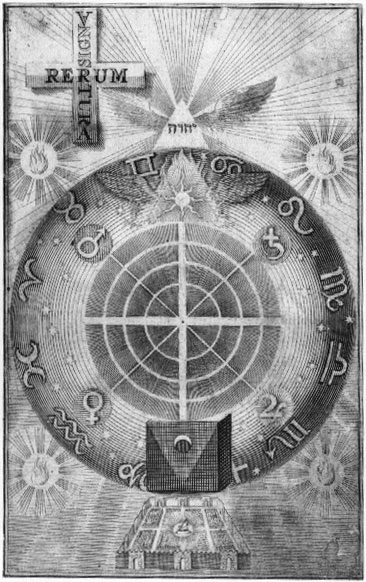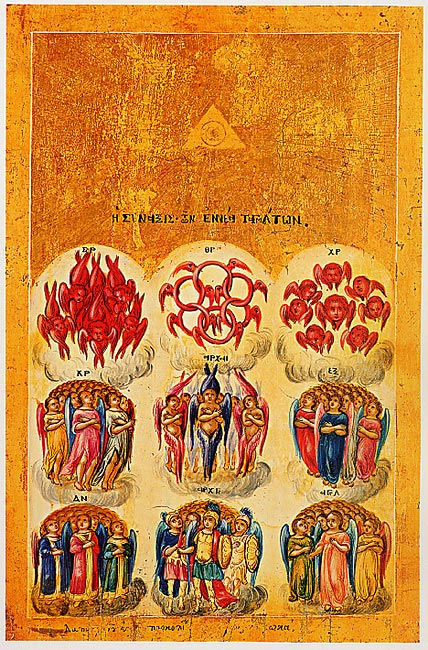DIVINITY by its nature, divines and transmutes.
To divine is to hold the ability to seek out, to be able to discern what one is seeking out and to know it when it is found, to recognize, to discover and uncover by an inner process which is intuitive, imaginative - of prophesy, of qualification, of knowing, of likeness and higher likeness - with an internal sensing for the goodness, greatness and godness of the inherent, the attribute, and soul of that within.
To transmute is to effect a change which is sequential and somewhat predictable, however needful of a catalyst, a power and a motivation, a governing foresight, an inner calling, a creative willing and cooperating, whilst also not changing the formal structure of the provisions at hand. Where worlds meet, we can find this process at the conjuncture, where there is a mutual exchange occurring.
To divine and transmute as divinity does, is that happening in which divinity recognizes portions of itself in that which is lesser than itself - divining therefore that which it knows - and by its own recognizing and loving powers, motivates the forces within and without to exude that goodness forth, which in turn and by so, affects the substance and condition of the surrounding dross relative to that goodness, becoming then causal to an exceeding and prevailing goodness, seeing that substance then furthered.
The plants seek out the light because the light seeks out the plants and calls to them. This is the working principle in example, and so it also becomes in all phases of evolution. Evolution is only ever effected because of the original design and goodness within a higher being, which calls forth a similar likeness and kindness to become responsive. Sometimes it is entirely a gift from above, so to speak.
As hard a truth as this is, and as vulnerable as it might make us, there is no equality within the spiritual worlds amongst beings as beings; and the lesser beings owe their gratitude for what they are and are to become, to those which are the higher. Father God's Life is borne within each and every one of course, however the actuality of their being which distinguishes them in capability and characteristic is apparent, and is dependent upon the goodness of others, for the place and the bearing that they hold.
The mission of divinity, as to reform and provide such ongoing encouragement, is therefore evident, and a consideration of the uppermost charity - also self evident within each and every realm. That which is unworthy of the interest of the heavens eventually dies back, falls away and transforms, adjoining with that which has gained more life by divine consideration.
The divine aspects of man and the reformation of lesser charges are exampled continuously, not only in conduct but by the many and varied processes of incarnating. Throughout the layers of hosts which attend each man, there will be similar involvements. Even the thought-world's population of thought-creatures is furthered in like way through the loving interests of any man.
Likewise to the above description of divinity, also can we parallel completely the multifold man who exhibits all range of cosmic activity within his own being concurrently. The very same processes as are operating in the highest principle of divinity are within him. The faculties which are called upon to discern and divine, and as also to reform thereby, are in working progress.
This is considered high practice. Therefore, suggested on this note alone, a man cannot despise his lower attributes or their appendage, as it is well possible that for him to continue on according to this principle, he will always bear this contrast within his being - relatively perhaps, but nonetheless holding aspects of the less-than-perfect, which are both part and parcel of his selfhood.
The morality of a man and his individuality, are both interdependent upon the amount of love he has come to know and has personally given as well. Not love in words or assumed persona, but in actual remonstration.
Although a sense of general morality is understood to lend a man an objective and empathetic perspective when called upon, it is driven firstly by love itself rather than by duty, obligation, karmic requirement or social/religious law. Morality is often associated with judgmental pessimisms, whereas true morality of the heart displays affection at all times. Love inspires knowledge and understanding, further empathy and onto a fulfilling morality. Criticism which is negative or condemnatory, often falsely represents a morality in place of the love-driven and love-inspired conduct which is the living morality.
Similarly, with exactness one's own individuality and loyalty to one's true self, is effected through loving and not by condemnation or judgmental criticisms. Self-improvement may be begun with sound reasonings, observations and strivings for certain attributes to be acquired. However, once again this will occur through expressions of and receiving love and not through a shame that shrinks from life or from selfhood.
Expectations from the Divine calling to Man, stream into his being and his consciousness in prismatic concord
There is not just one being which looks in upon us (individually) and calls us forth, but many; with one notable difference for us, contrasting us with many other beings besides - that we do decide much upon the forces and characters that we emulate.
Sometimes we are stimulated into activity by lesser gods who are persuasive or handsome, but we are privileged enough to hold the will and the deciding to refuse even their expectations of us. A god may shape a plant or foster a flock of creatures, but not own the shaping of a human individual. Neither by same warrant may another human being - parent, teacher or partner - assume the right or the license to shape, change or direct another to fulfill such expectations. People are strange like that. It simply isn't coherent with the freedom of men to ever do more than offer and then graciously withdraw if unrequired.
What of Christ in all of this? He knows us in this moment. In this moment there are no expectations, for we are to become but an experience completely of what we are, in His Love. Transcending the shortfalls, incorporating all and assuming them into His Perfection, His attention is not only for that part of us we may deem worthy, but for all of who we are. He is never frightened or repulsed. His Love is not conditional upon some future deed or perfection gained. In Him we have everything now, should we go to Him and ask to be received (and soothed).
It is not uncommon for an individual to try to effect change within a being, invoking his will this way and that. Innocently even, yet thoughtlessly so, there are many times the priest will go to the sacrament with expectations of a certain fulfillment, not asking, nor realizing his true place in the event about to take place. It is never a given that Father God is willed by us, and all graces, all matters of holiness and every angelic cooperation is directed from above, never from the man himself.Expectations from Man calling to the Divine often incur a tension within the man
How does Perfection ever become realized in Man?There are many philosophies and religious systems which are responsive to the faces of encouragement and direction that would inspire humanity, and all of these would assume a measure of perfection being the goal for the aspirant (in their eyes).
There are also mechanical landmarks that are spoken of:
• stages accomplished,• chakras ignited and enlivened,• schools of initiation and consciousness,• spheres traveled to and known,• temptations resisted
and so forth, which inspire the levels of perfection worked for. However and exceptionally there is also the paradisiacal perfection hearkened after or alluded to, which is often vague though imbibed with much meaning.
This end-of-the-journey Master/God/and Christ type of perfection is characterized in the thinking as being a 'pure' individual, a still-water soul, a saintly yet impenetrable ego, a calm-at-all-times rather dependable character - magical, if not an all-powerful nature-loving, adorable man or woman, adorned with wings and emblazoned with light. This description seems to be what most would probably come up with if formulating their thoughts as to the future individual they should progress into at some later stage.
They picture themselves to be
• benevolent (yet not wanting),• charitable (yet rich enough to give without it hurting),• sympathetic (higher than those they are feeling sorry for),• humble (and proud of the fact, considering their position),• joyful (there is no pain at the stage they have arrived to - or if there is they shall overcome it by some extraordinary means which means little at all),• incredibly attractive (but beyond the sensory urgings),• loved by life (with a saintly distance) and demi-god in the very least.
Their place of residence is an all time Golden Age, fragrant and sweet, equal to their own beauty - plentiful, opulent, luxuriant: a six star club of permanent abode for perfect citizens who enjoy a friendly environment with gentle breezes, even temperatures and like-minded souls. The animals never bite, the insects never sting, and the fountains bubble melodies to accompany the gentle whispers of their polite and complementary conversation.
Is this your ideal of perfection?
Conceit and sloth, conceit and perfection
The term 'perfection' often denotes an arriving - an arriving at a completion in which there is no more to be done or achieved once perfected. How closely related the concept of perfection can be to the sloth which does not promote the striving. There is a paradox. If one is not careful they can be striving for a slothful condition which renders itself static - not moving forward anymore or leaving room for greater possibility to ensue. This we find implied in the very notion of an attained perfection.
True love in freedom is as common as it is rare. All of Creation is an immediate expression of Love - living love - and we know this firsthand. We experience it within our beings uniquely.
The love that the higher beings hold for us brings only good things and teaches us to do the same. The love that the higher beings hold for us and demonstrate to us is given freely from them to us.
Now, the funny portion… 'love in freedom' - comment:
All love (true love) is freely given - all of it - given in freedom, not enslaved, and freely given without price, both.
Breaking from expectations and false divining as a practice
As explained, it is natural for us to look for the good in something or someone. It is natural for us to draw out such goodness and affect the surrounding nature into the bargain, for the better. However, there are times when these divine principles become a little off balance and are misguided - that we divine something which is not, expect something which is refused or inadequately provisioned; and we become deflated in ourselves and our instincts because of it.
An example of this becomes in the expectations a father might hold for his son. In earthly terms (not speaking of the spiritual realities here), it is understandable for a man to seek out in his offspring that which he would commend within himself - hope and watch for it to manifest - particularly at his prompting, loving and guidance. How very natural, when understood in the light of the divine principle of this working within our own individuality and throughout every being around.
So we do learn that expectations which are focused on actions - on deed, words, declaration and commitment - are quite separate to our loving and being loved.
In relationships we have a range of perfect and imperfect sharings. If we are free to exhibit both and still be loved, then we know an exceptional Love as given through the Son and the Father. This is the most intimate of loving, a true accepting, a true knowing, as they know us.
We can strive for this mutual honesty and consideration. Usually when folk hide the truth about themselves it is not because they consider themselves unworthy of love, were that their real self was known, but rather there is a measure of contempt for 'allowing' the other person to become honest about themselves in return. They believe themselves unable to love that person fully if their real nature was revealed in just response (which may or may not happen).
In other words, they can come to believe that love is threatened were that the other person was exposed (by their response to the truth put before them). It is a process of concealing the other by concealing oneself. This is an example of misplaced perfectionism.
Confusing self-divining with the Spiritual Hierarchy
Spiritually there can be a further difficulty encountered when individuals turn their perspective inward and see such potentiality within their microcosm; it defers their outer life out of existence! Certain periods of history feature distinct problems, this is not a time when this occurs to any great extent. There is far more of a difficulty for individuals to be impassioned or excited with the spiritual enthuses to be had, rather than be lost amongst the wonders of their outer or inner realities!
Expecting nothing and getting nothing. Expecting something wonderful and getting more …
Psilos Jim
Did a very silly thing,
He caught a fair bird,
And then plucked off her wing.
He then stuck wax and goo,
Shiny polish, feathers too,
Onto the hinge of her shoulder,
Hoping his invention the better.
And the bird made a nest on his head,
Sitting hot there it hatched a bright egg!
The egg broke revealing its life,
First two legs and then two shiny eyes.
With a squawk and a squeak it gave forth,
This tiny bright bird given birth;
To its mother it brought a spare wing -
Immeasurable love for its dad,
Psilos Jim.
Psilos Jim.
.jpg)









No comments:
Post a Comment